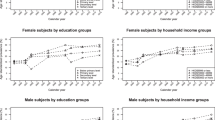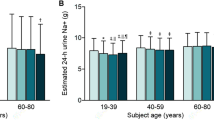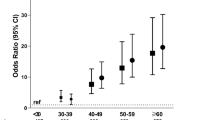Abstract
This is the first European study that has evaluated educational level in a large sample of hypertensive outpatients. We established the educational level of the hypertensive outpatients in our unit, and determined whether the awareness of hypertension and its organ damage was education-related. We analysed data from 812 consecutive outpatients (378 men, mean age 50 ± 10 years) with essential stage I–II hypertension. Subjects were subdivided into two categories: group A subjects were highly educated; group B subjects had a little education. Data were compared with educational level from the 1991 population census for the Campania region (ISTAT data) and with 200 type 2 diabetes patients (96 men, mean age 51 ± 9 years) from the nearest diabetes unit. For each hypertensive patient we considered clinical, echocardiographic and biochemical parameters. Data from the last census showed a high percentage (80%) of subjects with low education. The percentage of type 2 diabetic patients with little education was high (190 patients, 95%). Conversely, it is somewhat surprising that most hypertensive patients reached high standards of education and worked at sedentary jobs (group A: 736 patients, 91%; P < 0.0001). Multivariate analysis showed that only diastolic blood pressure (P = 0.03) was independently associated with low educational level. Compared to diabetes, hypertension and its risk factors are relatively unknown to people with little education. Education is associated with greater health care and awareness that may overcome the risk related to low physical activity. Thus, we stress the importance of a sound health policy able to reach out to the uneducated and make them aware of hypertension and the health care services available to them.
This is a preview of subscription content, access via your institution
Access options
Subscribe to this journal
Receive 12 digital issues and online access to articles
$119.00 per year
only $9.92 per issue
Buy this article
- Purchase on Springer Link
- Instant access to full article PDF
Prices may be subject to local taxes which are calculated during checkout
Similar content being viewed by others
References
Burt VL et alTrends in the prevalence, awareness, treatment and control of hypertension in the adult US population. Data from the health examination surveys Hypertension 1995 26 60–69
Guideliness Subcomittee 1999 World Health Organization-International Society of Hypertension guidelines for the management of hypertension J Hypertens 1999 17 151–183
Dyer AR, Stamler J, Shekelle RB, Schoenberger J The relationship of education to blood pressure. Findings on 40,000 employed chicagoans Circulation 1976 54 987–992
Stamler J Multyvariate analysis of the relationship of seven variables to blood pressure: findings of the Chicago heart association detection project in industry J Chron Dis 1976 28 527–531
Pappas G, Gergen PG, Carroll M Hypertension prevalence and the status of awareness treatment, and control in the Hispanic Health and Nutrition Examination Survey (HHANES) Am J Public Health 1990 80 1431–1436
Jacobsen BK, Thelle DS Risk factors for coronary heart disease and level of education Am J Epidemiol 1988 127 923–932
Winkleby MA, Jatulis DE, Frank E, Fortmann SP Socioeconomic status and health: how education, income, and occupation contribute to risk factors for cardiovascular disease Am J Public Health 1992 82 816–820
Vargas CM, Imgram DD, Gillum RF Incidence of hypertension and educational attainment: the NHANES I epidemiologic follow-up study. First National Health and Nutrition Examination Survey Am J Epidemiol 2000 152 272–278
Tyroler HA Socioeconomic status in the epidemiology and treatment of hypertension Hypertension 1989 13 194–197
Wagenknecht LE et alCigarette smoking is strongly related to educational status: the CARDIA study Prev Med 1990 19 158–169
Liberatos P, Link BG, Kelsey JL The measurement of social class in epidemiology Epidemiol Rev 1988 10 87–121
Marceca M, Fara GM Socio-economic determinants in conditioning Health Care access Ann Ig 2000 12 49–57
13° Censimento generale della Popolazione 1991 – Campania – cap 1 La Campania negli ultimi 30 anni attraverso i censimenti. Roma 1991 p 67
Devereux RB, Reichek N Echocardiographic determination of left ventricular mass in man: anatomic validation of the method Circulation 1977 55 613–618
Kaplan NM Systemic Hypertension: mechanisms and diagnosis. In: Braunwald E (ed) Heart disease WB Saunders Company: Philadelphia 1997 p 807
Hypertension Detection and Follow-up Program Cooperative Group: educational level and five years all cause mortality in the Hypertension Detection and Follow-up program Hypertension 1987 9 641–646
Yen IH, Kaplan GA Neighbourhood social environment and risk of death: multilevel evidence from the Alameda Country Study Am J Epidemiol 1999 149 898–907
Carrillo JE, Green AR, Betancourt JR Cross cultural primary care: apatient based approach Ann Internal Med 1999 130 829–834
Novack D Therapeutic aspects of the clinical encounter. In: Lipkin M Jr, Putnam SM, Lazzare A (eds) The medical interview: clinical care, education and research Springer-Verlag: New York 1995 pp 32–49
Takeuchi DT, Sue S, Yeh M Return rates and outcomes from ethnicity-specific mental health programs in LosAngeles Am J Public Health 1995 85 638–643
Scott CJ Enhancingpatient outcomes through an understanding of intercultural medicine: Guidelines for the practitioner Med J 1997 46 175–180
Low SM The cultural basis of health illness and disease Sorc Work Health Care 1984 9 13–23
Muecke MA Caring for Southeast Asian refugeepatients in the USA Am J Public Health 1983 73 431–438
Quesada GM Language and comunication barriers for health delivery to a minority group Soc Sci Med 1976 10 323–327
Lum CK, Koreman SG Cultural-sensitivity training in US medical schools Acad Med 1994 69 239–241
Poulton J, Rylance GW, Johnson MR Medical teaching of the cultural aspects of ethnic minorities: does it exsist? Med Educ 1986 20 492–497
Stamler J Metabolic and nutritional factors in hypertension. Blood pressure and high blood pressure: aspects of risk Hypertension 1991 18 (Suppl I) I95–I107
Zdrojewski T, Pienkowski R, Szynkiewicz M, Krupa-Wojciechowska B Have rapid socioeconomic changes influenced awareness of blood pressure in Poland? J Hum Hypertens 2001 15 247–253
Krakoff LR Comment on elevated blood pressure in men accompanyingpatients to obstetrician’s office Am J Hypertens 2000 13 1053–1054
Kleinstein RN, Gordon A, Wayne J, Charles E 5-years follow-up of the effects on optometrists of continuing education about hypertension Public Health Rep 1985 100 364–368
Author information
Authors and Affiliations
Corresponding author
Rights and permissions
About this article
Cite this article
Tedesco, M., Di Salvo, G., Caputo, S. et al. Educational level and hypertension: how socioeconomic differences condition health care. J Hum Hypertens 15, 727–731 (2001). https://doi.org/10.1038/sj.jhh.1001249
Received:
Revised:
Accepted:
Published:
Issue Date:
DOI: https://doi.org/10.1038/sj.jhh.1001249
Keywords
This article is cited by
-
Determinants of self-reported hypertension among women in South Africa: evidence from the population-based survey
Clinical Hypertension (2022)
-
Periodontal and systemic health of morbidly obese patients eligible for bariatric surgery: a cross-sectional study
BMC Oral Health (2022)
-
Socio-demographic and lifestyle factors associated with hypertension in Nigeria: results from a country-wide survey
Journal of Human Hypertension (2022)
-
Self-reported Hazardous Drinking, Hypertension, and Antihypertensive Treatment Among Hispanic Immigrants in the US National Health Interview Survey, 2016–2018
Journal of Racial and Ethnic Health Disparities (2021)
-
A population-based national estimate of the prevalence and risk factors associated with hypertension in Rwanda: implications for prevention and control
BMC Public Health (2018)



